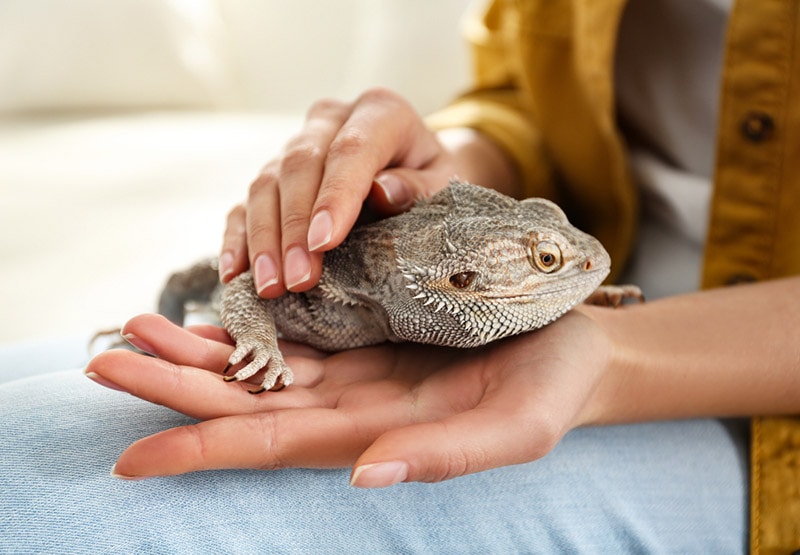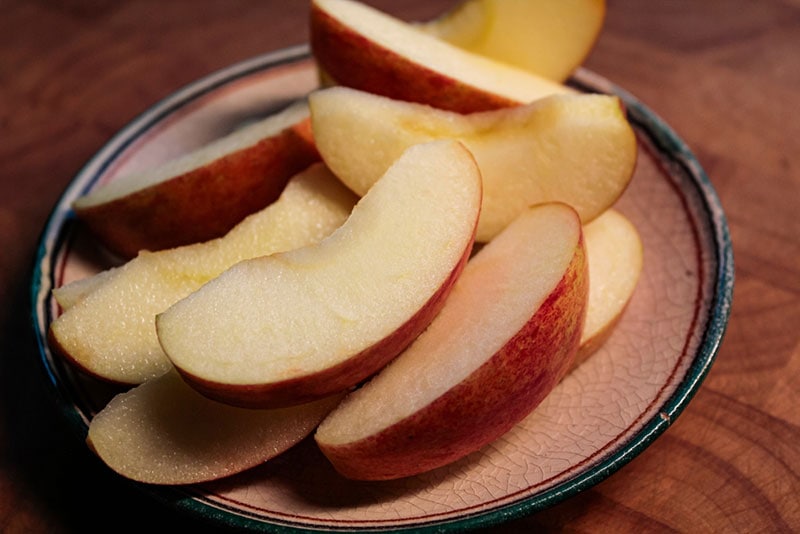Can Bearded Dragons Eat Maggots? Vet-Reviewed Nutrition Facts
Updated on
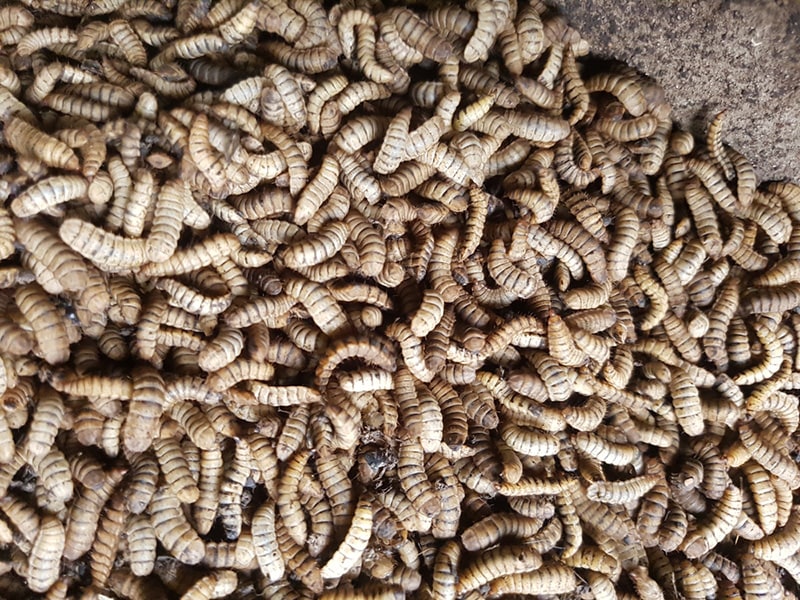
Have you ever peered into your bearded dragon’s cage and wondered, “Hey, can my bearded dragon munch on maggots?” If so, you’re not alone! This question pops up quite a bit among reptile pet parents. The answer? Sure, your bearded dragon can snack on maggots, but it’s not as straightforward as it seems.
While maggots can provide key nutrients and fats, feeding them to your dragon buddy should be done with a bit of caution. Not all maggots are created equal! The little buggers you might find outside in your compost bin or trash can carry harmful parasites or bacteria. If they end up in your dragon’s belly, it could lead to trouble. So, it’s crucial to only offer your beardie store-bought or captive-bred maggots, to ensure you’re not introducing any unwanted guests to your dragon’s digestive system.
As the saying goes, variety is the spice of life. That is equally true for bearded dragons as it is for us! Maggots should only form a part of their well-rounded diet, alongside a diverse mix of insects, fruits, and veggies.
What Are Maggots?
Maggots are the larval form of flies; more specifically, house flies, blowflies, and cheese flies, and beardies love them almost as much as we love cheese fries! It’s natural to think of them as dirty or diseased; we usually associate them with garbage or rotting flesh! But the humble maggot is only as dirty as where they are laid, which is why captive-bred is best.
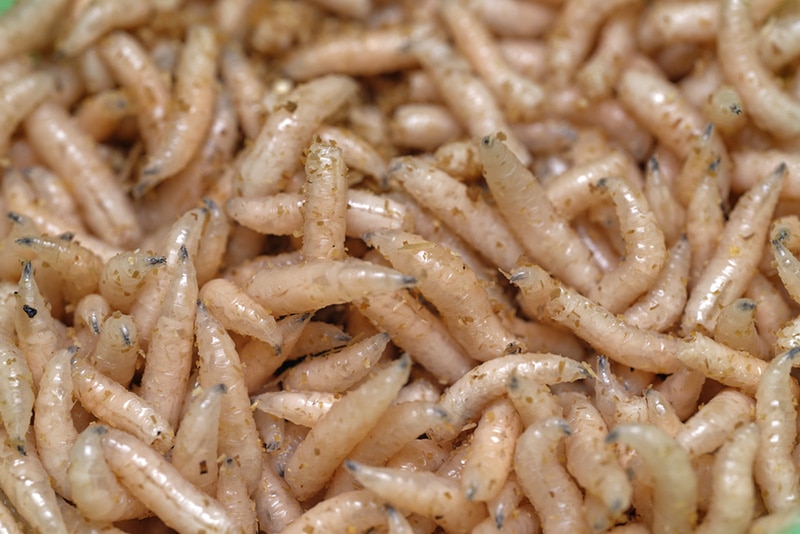
The Upsides of Maggots on the Menu
There’s a reason why maggots might be considered a good treat for your bearded dragon. They come with a fair share of health benefits. Let’s have a closer look:
- Better Digestion: Maggots come packed with beneficial bacteria. These little microorganisms work wonders for your dragon’s digestion, breaking down their food more effectively. It’s like a team of tiny food processors in their belly!
- Appetite Boost: If your dragon friend isn’t feeling too peckish, a maggot might just do the trick. Their high protein content gives dragons the energy boost they need, helping stimulate their appetite.
- Disease Defense: Bearded dragons can be prone to a variety of illnesses, including bacterial infections like salmonella. Maggots, when sourced from safe and reliable places, can help keep their digestive system healthy, reducing the risk of disease.
- Immunity Improvement: Maggots are a good source of vitamins and minerals, giving your dragon’s immune system the support it needs to fend off potential illnesses.
- General Health Boost: The essential nutrients that maggots carry can enhance the overall health of your dragon, filling in any nutritional gaps in their diet and keeping them robust and vigorous.
What’s in a Maggot? A Look at the Nutritional Value
Maggots have a lot going on nutritionally. They can provide:
- Protein: An essential nutrient for muscle building and maintaining healthy skin and bones. Maggots pack about 22–24 grams of protein per 100 grams.
- Fat: These are energy-rich lipids that help keep your dragon’s energy levels up. Maggots contain about 6–8 grams of fat per 100 grams.
- Carbohydrates: Maggots have moderate carbohydrates (around 10 grams per 100 grams) that aid in digestion and absorption of other nutrients.
- Vitamins and Minerals: Packed with vitamins A, C, E, K, and choline, maggots also carry minerals like zinc, iron, and magnesium that help strengthen your dragon’s immune system.
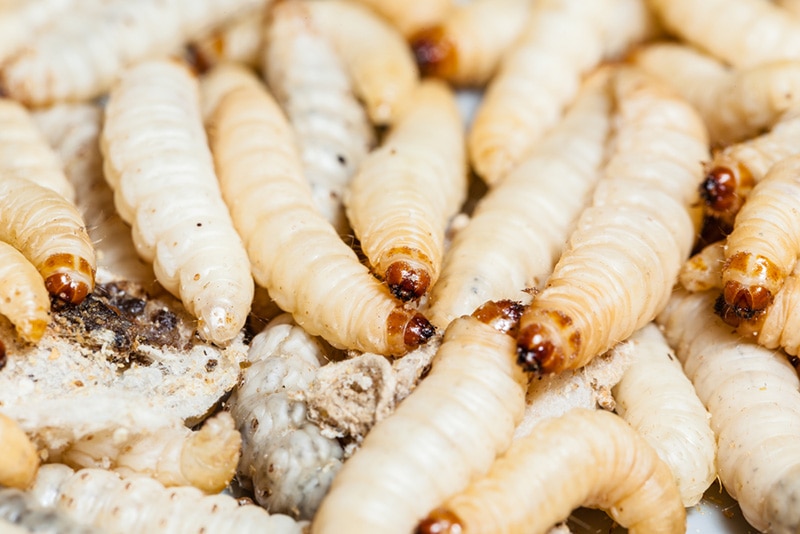
The Vitamins and Minerals Your Bearded Dragon Needs
- Vitamin A: Also known as retinol, Vitamin A helps maintain your dragon’s skin and vision. You can also find it in leafy greens, like spinach and kale, and orange fruits and vegetables, like carrots and pumpkin.
- Vitamins C and E: These are powerful antioxidants that help protect your dragon’s cells from damage. Both are found in fruits and veggies, such as bell peppers and tomatoes.
- Vitamin K: Crucial for blood clotting, you can also find it in leafy greens, broccoli, and Brussels sprouts.
- Choline: It plays a role in maintaining cell structure and messaging. Egg yolks and fish are good sources.
- Zinc, Iron, and Magnesium: Essential for many biological functions, including immune function and metabolism. These minerals are found in a variety of foods, including nuts, whole grains, and green leafy vegetables.
The Not-So-Good Side of Maggots
Even with their nutritional punch, maggots come with some potential downsides that you should be aware of.
- Imbalanced Diet: Despite their nutrient richness, maggots could lead to nutritional imbalances if they are the primary food for your bearded dragon. Too much protein and fat can lead to malnutrition and health issues.
- Parasitic Infection: If not properly handled or stored, maggots can carry parasites, which can potentially infect your pet.
- Choking Hazard: For smaller dragons, maggots might be a bit challenging to handle and can pose a choking risk.
- Allergic Reaction: Though rare, some dragons may have an allergic reaction to maggots. Signs of this can include difficulty breathing, swelling, and skin irritation.
- Obesity Issues: Too many maggots can lead to weight issues in bearded dragons. Obesity in dragons can lead to reduced energy levels and other health complications.
So, if you’re thinking of introducing maggots into your bearded dragon’s diet, remember the golden rule of feeding: moderation is key. No more than 8–10 maggots a week for adults and juveniles, adjusting as your dragon grows.
And don’t forget, maggots are only part of the story. They should be accompanied by various other food items like vegetables, flowers, and fruits.
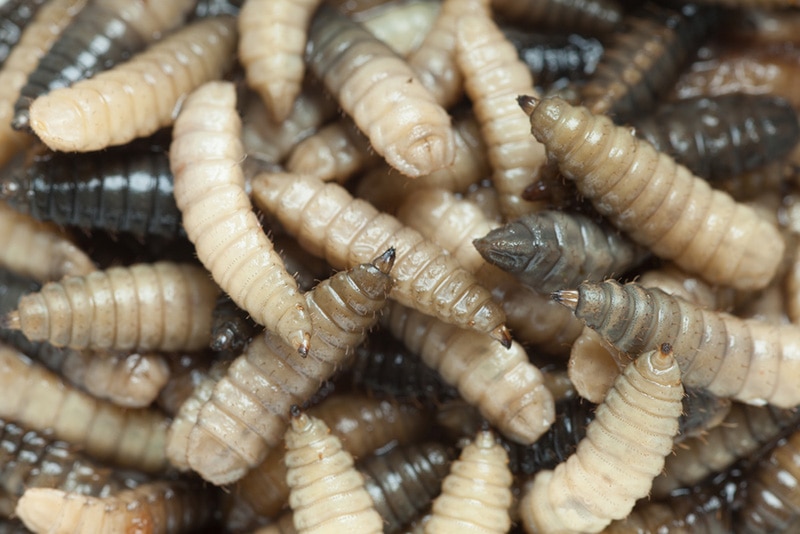
Other Insect Alternatives
If the thought of feeding your dragon maggots makes you squirm, or if you’re looking for variety, there are plenty of alternatives out there:
- Crickets: These are a staple in the diet of bearded dragons. High in protein and relatively easy to digest, they’re an excellent choice for your scaly friend.
- Mealworms: Another favorite snack for bearded dragons, mealworms are good sources of protein and fat, but they should be given in moderation due to their high chitin content, which can be hard for dragons to digest.
- Dubia Roaches: These insects are increasingly popular as they offer a lot of protein and are easy to digest. They also have a better calcium-to-phosphorus ratio than many other insects, which is important for bone health in bearded dragons.
- Silkworms: These soft-bodied worms are highly nutritious and low in fat, making them a good choice for a treat. They’re also rich in calcium and protein.
- Butterworms: High in calcium, butterworms are a nutritious treat. They’re quite fatty, though, so they should only be given sparingly.
- Phoenix Worms: Also known as calci-worms, they’re rich in calcium and protein and low in fat.
- Nightcrawlers: Also known as earthworms, these wriggly worms can provide lots of essential nutrients, but most beardies don’t like the taste.
Conclusion
Incorporating maggots into your bearded dragon’s diet can be beneficial due to their nutritional value, but it’s vital to source them responsibly and feed them in moderation. Too many maggots can lead to nutritional imbalances and potential health issues.
Remember that a balanced diet for a bearded dragon should include a variety of insects, vegetables, and fruits. As your dragon grows and matures, adjust their diet accordingly. Feed juveniles a diet high in protein and gradually shift to a diet that’s primarily plant-based as they reach adulthood. Always gut-load and dust insects with calcium before feeding them to your dragon.
Resist the urge to go into “hunter-gatherer” mode and start collecting creepy-crawlies from your own garden. Not only could you misidentify a species and give your beardie something toxic, but there’s no way of knowing what parasites, herbicides, or other potentially harmful chemicals free-roaming bugs have been exposed to. Always source your live food from a reputable reptile supplier.
Keeping your dragon’s diet varied and balanced, coupled with proper hydration, will go a long way in ensuring their health, happiness, and longevity. It’s an important part of being a responsible and caring bearded dragon parent!
See also:
- Can Bearded Dragons Eat Moths? Vet-Reviewed Nutrition Facts & FAQ
- Can Bearded Dragons Eat Bees? Vet Approved Facts & FAQ
Featured Image Credit: andanatb, Shutterstock


